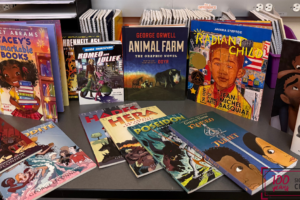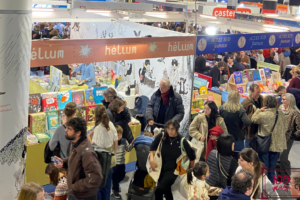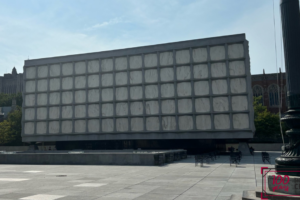In June, I was awarded a Lambda Iota Tau (LIT) Research Grant from Sigma Tau Delta to conduct research for my dissertation, Spaces of Assimilation: Multiethnic American Women’s Writing and the Gothic. With Sigma Tau Delta’s generous support, I was able to visit the Tenement Museum, located in New York’s Lower East Side.
Unlike other museums that offer self-guided exhibits, the museum’s enthusiastic, expert educators walk visitors through apartments that have been preserved to reflect the daily lives of immigrants from China, Eastern Europe, Germany, Greece, Italy, Ireland, Puerto Rico, and Russia who lived there from the 1860s–1930s. The Tenement Museum’s restoration efforts include recreating apartments based on archival materials (such as census information, photographs, and newspapers) as well as interviews with the children, grandchildren, and great-grandchildren of immigrants who lived there themselves or visited relatives who lived there.
The Tenement Museum’s attention to detail is remarkable, extending to what kind of soap families used to wash their dishes to what kinds of foods they ate for breakfast to where certain pictures hung on the walls. Through these efforts, the Tenement Museum invites visitors to explore the homes of immigrant and refugee families in New York City, sharing their stories to highlight the contributions of ordinary people to American history and to promote a more inclusive understanding of American society.
During my visit to the Tenement Museum, I was able to participate in three apartment tours (“Under One Roof,” “Family Owned,” and “Tenement Women: 1902”) and one walking tour (“Foods of the Lower East Side”). These tours exemplify what the Museum refers to as “peopling” the tenements; for example, rather than regale visitors with a rote history of the Lower East Side’s garment district, visitors experience this history by walking through the apartment that once belonged to the Levines, a Jewish immigrant family who operated a garment factory out of their apartment. This notion of conducting research as a means of “peopling” the past has shaped the way I think about the humanistic aims of my research and the kinds of cultural contributions that English studies can make.
As a scholar-teacher interested in minority and immigrant women’s experiences as laborers, wives, mothers, artists, and Americans throughout the Progressive Era, I feel incredibly fortunate to have visited the Tenement Museum. When researching the Lower East Side tenements, it can be easy to characterize these spaces as sites of hardship and struggle, where families shared cramped quarters and worked long hours for a chance at an American Dream that may have never materialized. But the Tenement Museum emphasizes that these spaces were also sites of joy, discovery, solidarity, and intercultural collaboration. It is a privilege to step back in time—if only for an hour—and honor these families’ legacies.
I look forward to incorporating my findings into my dissertation and exploring new, inspired research questions in future projects. After defending my dissertation in May 2025, I plan to revise it into a scholarly monograph for an academic press interested in long-nineteenth-century American literature and culture.
 Alexandra Anderson
Alexandra Anderson
Lambda Iota Tau (LIT) Research Grant Recipient, 2024
Alpha Omicron Chapter
Purdue University West Lafayette, West Lafayette, IN
Lambda Iota Tau (LIT) Research Grant
Lambda Iota Tau (LIT) Research Grants are designed to support individual members at the undergraduate or graduate level as they complete original research that furthers the goals of the Society. Grant money of up to $1,000, with up to $500 for runners-up, will support travel to and use of archives or collections important to their research. The winning applicants will demonstrate the relevance of the research to English and English-related fields and may also describe the effect on current coursework, future research, or career pursuits.
Application Deadline: April 7, 2025—All research travel and the resulting written or presented outcome must be completed before May 2026.
Past LIT Grant Recipients
Sitting in the Beinecke with Stick Figures: A LIT Grant
Visiting Dickinson and Plath with a LIT Grant
My LIT Grant Adventures in the Alice Archive
Turning Pain into Poetry with a LIT Grant
An Idea, An Idea—A LIT Research Grant
Discarded Garbage: Poetic Images of Humanity
Writing On Both Sides, A Tale of Literary Obsession
What Do I Write?







Add Comment